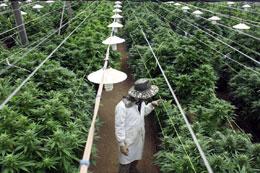Asia on the hunt for Canada cannabis tech

By Mata Press Service
Marijuana legalization is making strides across Asia, as several nations move to dismantle draconian anti-drug laws to capitalize on the fast-growing medical cannabis market.
As the investment opportunities in the cannabis industry in the region grows, several players aiming to be in front of the line for permits to cultivate, extract and export are seeking out partnerships with Canadian seed-to-sale medical marijuana companies.
“Canada’s tech in this sector is much sought after by players in Asia who want to enter the market,” said a spokesman for a Vancouver-based consultancy, which has helped Canadian cannabis companies reach out to Asia.
“Several of the Asian nations, that once were strict-on-drugs have softened their stance and are looking at medical applications for cannabis to treat epilepsy, chronic pain and other conditions,” said the company official, who spoke to Mata Press Service.
“But each of these countries also have pockets of political resistance, a complicated pathway to full legalization and fears that unchecked commercial grows will lead to more drug-related problems.
“Companies that are looking at Asia must have a strong educational component in their plans to help educate the public, politicians and health officials on the benefits of medical marijuana,” he said.
The consultancy is currently working on enquiries for technology and R&D partnerships in Malaysia, Thailand, Sri Lanka, Philippines and India.
“We also have one from Greece,” he said.
In Malaysia, two groups are looking for technology partnerships for university-led R&D programs that will lead to commercial permits.
“These are groups that have strong relationships with local universities after the Malaysian government said last July there should be decriminalization of marijuana.”
“They are looking primarily for science advisory services and tech know-how”.
A representative of one of the companies in Malaysia said they are working on a R&D plantation project in East Malaysia to “study the therapeutic applications of cannabis for its curative treatments of a wide range of human medical conditions.”
Sri Lanka which has begun cultivating cannabis for medical purposes across 100 acres of designated cannabis plantation land in the north-central region of the island state, is also looking for new opportunities.
A family-owned conglomerate there is now looking to establish a partnership with a fully-integrated seed-to-sale Canadian entity for a licence that will primarily serve the nation’s domestic Ayurveda traditional medicine market.
In The Philippines, which this month allowed the use of cannabidiol (CBD) for alleviating severe forms of epilepsy, a tribal agriculture cooperative is looking to set up a medical cannabis cultivation, extract and export facility in Baguio City.
“We are looking to set up a joint-venture operation that will boost the economy of our local community,” a co-operative official said via email to Mata Press Service
India this week announced its first international collaboration on a cannabis medicinal project to produce and export drugs for pain relief in cancer, diabetic and neuropathy.
The project is a collaboration between the Indian Institute of Integrative Medicine (IIIM) in Jammu and IndusCann, a Canadian company.
Another India-Canada enterprise, is now in the final stages of permitting for a 1,000 acre grow operation to manufacture cannabis concentrates that are used to make edibles, topical ointments, capsules and other packaged products.
Thailand which has fully legalized medicinal cannabis has seen several Canadian companies trying to establish partnerships with local companies.
“The pathway to full licence in Thailand revolves around R&D projects with established universities,” said the Vancouver consultant, who recently facilitated a technology meeting in Bangkok between a Vancouver-based cannabis investment group, a Thai medical marijuana company and researchers from a local university.
“Canadian cannabis tech is in demand not only in Asia as we have seen requests from European players as well,” he said.
One company in Greece, which is fully permitted by the State, is looking for a technology partner for its 85 acre grow and EU-certified extraction facility in the Thessaly region.
Medical marijuana investment analysts agree that Asia is a significant market as it is on track to have the oldest population in the world very soon and with old age comes many chronic diseases.
Prohibition Partners, a consultancy group, estimates that Asia’s medicinal cannabis market could by 2024 be worth $5.8 billion.
But it cautions that while recreational cannabis is expected to outperform medicinal cannabis
in western markets, in Asia, the opposite is likely to be true.
As for investment opportunities, many are still reluctant to actively bet on the commodity due to the social stigma around the plant, according to Prohibition Partners.
“While Asian nations are unlikely to be as accepting of recreational cannabis, they may be more likely to accept medicinal cannabis if it is supported with evidence-based research that it could help the continent’s aging population as well as an unprecedented rise in healthcare costs. Thailand, Singapore, and China are all beginning to invest in research into medical cannabis applications,” reports the London-based Prohibition Partners.
Asia, while socially conservative, can look to recent Canadian policy reform to guide its entrance into the market, reported Asia Times.
“Canada is pioneering the global cannabis industry and is regarded as the most cannabis-friendly nation in the world, having legalized and regulated medical and recreational usage. “Thoughtful policy shifts in Ottawa have allowed the country to create an incredibly valuable economic sector that helps boost the national budget. Indeed, Asian nations are looking to Canada for best practices amidst an ever-expanding global market,” the news agency reported.






